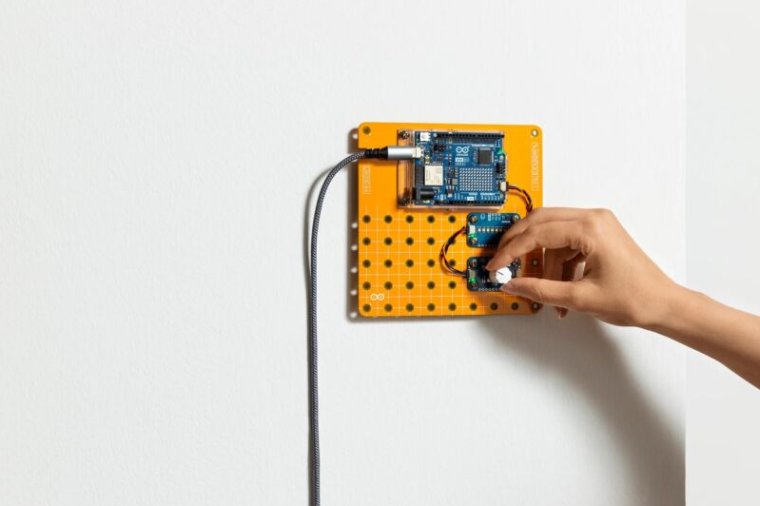
I know how to solder, but I do not always want to solder, and I think there are a lot of folks like me. Even if the act itself can be done (and undone, and redone), the friction of hauling out the gear, preparing a space, and fine-motor-skilling a perfect shiny blob can put a halt to one’s tinkering ambitions.
Arduino, the building block of many off-hours projects, has put the challenge to you, your kids, or anyone you know who just needs the right kit to fall down a rabbit hole, minus a dangerously hot iron. The Arduino Plug and Make Kit has at its core an Arduino UNO R4 board with Wi-Fi, Bluetooth, and a built-in 12×8 LED matrix display. That board gets screwed into the prime lot on a yellow board, and then you pick from among seven other “Modulino” boards to attach. By “attach,” I mean running one of those little push-in-with-your-fingers cables from the main board to a little board, and maybe daisy-chaining from there. All your boards fit onto the larger base with M3 screws and nuts, and the whole thing is powered by a USB-C cable (with USB A or C on the other end).
-
The contents of Arduino’s Plug and Make Kit.
-
The “Modulino” nodes.
-
The wonderful board for the Arduino experiments.
What can you plug in? A knob, eight LEDs, a proximity sensor, a motion sensor, a simple buzzer/speaker, a temperature/humidity sensor, and three simple buttons. With those things, the newcomer can make a low-key weather station, an 8-bit-style synthesizer, a smart lamp controller, and a few other things (registration required). Of course, those are just the starter projects put together by Arduino; on the web, in the corners of GitHub, and inside the curious mind, there are loads of other things to be built.
There’s a little shell case for the main Arduino board included with the kit, which could help with weather-proofing a bit. But whatever project you make with this kit is going to look like a lightly spiffed-up breadboard object. That can be a great thing. The timer I use to try to keep myself working in 25-minute segments is an Adafruit Circuit Playground Express, programmed to light up in a clock-ish ring and then play the Legend of Zelda “discovery” tune after every sprint. There are lots of timers, even Pomodoro-technique-specific models, that are cheaper, smaller, and purpose-built. But I like my goofy little timer specifically because I can see the guts of it.
The Arduino Plug and Make Kit costs $87 at the moment and is still in stock as of this writing.
https://arstechnica.com/?p=2036761

